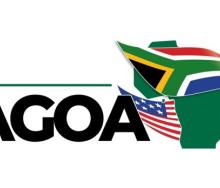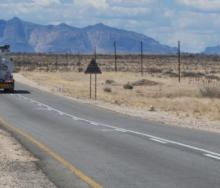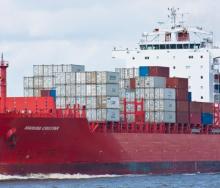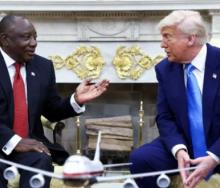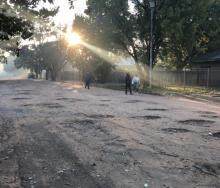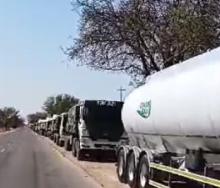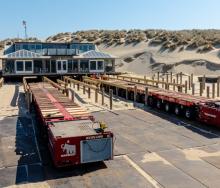African economies can bring about meaningful change through the transformation of the cross-border transport system, creating not only an environment that seeks to promote meaningful intra-Africa trade, but also increased levels of trade.
The Cross-Border Road Transport Agency (C-BRTA), in collaboration with other stakeholders in the transport and trade industry, recently hosted a trade and transport webinar which saw public sector stakeholders from the Common Market for Eastern and Southern Africa (COMESA), East African Community (EAC), and the Southern African Development Community (SADC) engaging on important matters affecting cross-border trade and transport in the region.
The main purpose of the seminar was to afford stakeholders the opportunity to discuss key issues that affect transport and trade in the SADC region, as well as to share information regarding interventions required to bring about efficiencies.
According to Lwazi Mboyi, the acting CEO of the C-BRTA, improved communication between stakeholders is critical in driving change - not only in the region, but across the continent. “Ongoing conversation between stakeholders at different governmental and agency levels is extremely important, not only to raise awareness around the issues being faced, but also to find the right solutions that will work across the region. Strategic partnerships, collaboration and improved communication are, therefore, very necessary to resolve the bottlenecks affecting cross-border transport and regional trade,” he said.
The two-day virtual seminar, attended by ministries, departments and agencies responsible for transport, traffic and trade facilitation in the COMESA-EAC-SADC tripartite, regional secretariats and corridor management institutions, and experts from across the world, highlighted this need for collaboration to transform the cross-border environment and improve intra-Africa trade and socio-economic development.
“It is imperative that we decisively deal with the constraints and non-tariff barriers which negatively affect the performance of the cross-border transport system and in the corridors linking the COMESA-EAC-SADC tripartite,” he said. “Improved cooperation and collaboration through the sharing of information amongst stakeholders in the region are necessary to effect the change required. It is only through such an approach that we can ensure cross-border road transport operations are underpinned by a harmonised regulatory environment and a predictable operating environment.”
Mboyi said the development of an action plan was therefore an important outcome of the two-day seminar as it would serve as a proposed recipe for solving transport and trade problems in the region.
“More so, the plan holds us responsible for moving certain processes forward,” he said.
According to Mboyi, much impetus has been given to these discussions on a regional level by the African Continental Free Trade Area (AfCFTA) which came into effect in January this year.
“This is probably one of the most brilliant developments in recent years that sets out to integrate Africa into one market. We have to, however, be cognisant that there are challenges in delivering on this mandate.”
Mboyi said there were two categories of issues that regional stakeholders had to consider in their deliberations. “The first is around infrastructure. What do we need in place on the ground to allow for improved movement of people and goods and the funding of that infrastructure? The second category is softer and looks towards the regulatory and legal regimes that we need to harmonise to ensure a smoother flow of passengers, goods and services.”
He said in this regard there was low hanging fruit that could be picked, and it was through discussion at seminars such as these where opportunities could be identified and action plans drawn up.
According to Mboyi, this was achieved at the latest meeting with several interventions identified by stakeholders. “This plan gives priority to where our focus must be if we are to improve the cross-border transport and trade environment in the COMESA-EAC-SADC tripartite and Africa at large.”
At the top of the priority list is the acceleration of the implementation of the African Continental Free Trade Area. Stakeholders at the seminar agreed there was a need for practical programmes, including acceleration of the implementation of regional road network infrastructure projects across the region, as well as the harmonisation of the transport and trade regulatory environment to improve trade and transport efficiency.
The seminar also identified the need for capacity building concerning regulatory and law enforcement authorities in the region.
It also identified border infrastructure improvement as a top priority going forward. “This includes not only the maintenance thereof, but also the expansion and construction of new infrastructure as well as the expansion of border approach roads capacity,” explained Mboyi.
The implementation of One-Stop-Border Posts (OSBPs) was highlighted at the meeting, which called on government agencies and departments to provide funding for OSBP projects at prioritised key border posts.
“These efforts must be coordinated and prioritised and then implemented at regional and corridor level.”
According to Mboyi, the focus, however, cannot only be on the border posts themselves when it comes to improving cross-border trade.
“Encouraging relevant authorities to prioritise the maintenance of the regional road transport network to ensure reliable transportation of passengers and goods, as well as to promote sustainable and reliable funding for infrastructure investment without passing costs to transport operators and traders, is important.”
The seminar also called for the establishment of strategically located truck stops/roadside resting stations to improve the safety and security of drivers, vehicles and cargo. Reducing checkpoints in corridors will also bring about improved efficiency. Stakeholders agreed that the migration of all operations to joint law enforcement operations at a national level would go a long way to achieving this goal.
The harmonising of cross-border permit systems was another priority for the region, said Mboyi. This would happen through the Integrated Cross-Border Management System, which was also known as the Cross-Easy Permit application system, to introduce digital cross-border road transport permits in the region.
It was agreed at the meeting that the SADC secretariat, TKC secretariat, the Department of Transport, and the C-BRTA would engage on Cross-Easy for regional adoption and integration with other regional systems. A plan of action will be developed after these consultations.
Harmonisation of road user charges, such as vehicle licence fees, permit fees, toll fees and road access fees also had to be prioritised. The seminar called on departments and agencies responsible for transport to share updated information on these charges to harmonise at the corridor or regional level based on reciprocity.
“As a region, we need to be promoting industrial development in the region through the development of Regional Industrial Policy instruments as well as accelerating industrialisation with a focus on improving local production capacity within the region,” said Mboyi.



